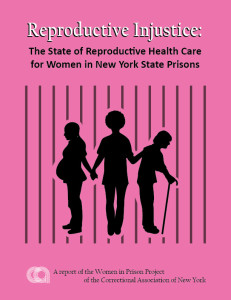POST WRITTEN BY: Brad Landau (‘16), Pace Law School & Natalie Felsenfeld (’16), Pace Law School
Women in New York State prisons face many challenges. Women’s rights to reproductive health care and obstetrics and gynecology (OBGYN) treatment are often not protected and even violated. The Correctional Association of New York (CA), an independent, non-profit criminal justice advocacy organization, aims to create fair and humane criminal justice system in New York, and as such a safer and more just society for all. Created in 1991, the CA’s Women in Prison Project (WIPP) works to reduce the overuse of incarceration for women, ensures that prison conditions for women are as humane as possible, and aims to create a criminal justice system that treats all people and their families with fairness and dignity.
On April 1, 2015, we attended the Pace CJI event on the Rights of Incarcerated Women in New York State Prisons, which focused on the recently published report by the WIPP of the CA titled Reproductive Injustice: The State of Reproductive Health Care for Women in New York State Prisons. This report focuses on the New York State Department of Corrections and Community Supervision (DOCCS) that oversees the operation of all state prisons in New York. The report highlights and outlines the challenges incarcerated women face as a result of mistreatment by medical personnel and correctional officials as well as the inadequacy of policy-making in New York State. The report concludes that incarcerated women receive substandard OBGYN care, including the fact that pregnant women are still being shackled pre-, during and post- labor, even though the N.Y. Correc. Law § 611 (McKinney 2015) (also known as the NYS 2009 Anti-Shackling Law) prohibits the use of restrains of any kind when a “woman is in labor, admitted to a hospital, institution or clinic for delivery, or recovering after giving birth.”
WIPP is currently working to amend the 2009 Anti-Shackling Law to incorporate mechanisms that would ensure compliance with the laws by correctional officers. Among these mechanisms are:
- Continually publishing information about the law;
- Publicly reporting shackling practices and other violations;
- Offering regular and effective training of all correction officers and medical personnel about the relevant statutory and regulatory provisions; and
- Ensuring that incarcerated pregnant women are informed about their rights under the law.
One of the panelists shared a story about a woman who gave birth in a correctional facility: the woman was in pain for 25 hours before the correctional officers believed that she was in labor. She also described her personal experience of giving birth while incarcerated. During her childbirth, she was told to “shut up” by correctional officers on the way to the hospital while her contractions were 2 minutes apart. Additionally, most incarcerated mothers are separated from their newborns immediately after birth unless they are fortunate enough to get into the nursery program.
Moreover, many women in prison have been victims of sexual abuse or assault; thus, being subjected to substandard OBGYN care often re-traumatizes them. One of the panelists described how she was a victim of sexual abuse, and how having male correctional officers present during her OBGYN visits made her feel re-victimized. The CA’s report confirms that DOCCS does not provide medical care that is “trauma informed,” meaning that medical personnel in prisons are not trained in how to recognize and understand the impact of trauma on incarcerated women and how to provide care without re-traumatizing their patients. This is an issue that should be addressed in the future because incarcerated women should not have to re-live their psychological and physical harms of their past.
Another panelist also shared her experience with NYS’s unequal approach to offering plea bargains at arraignments to men compared to women. According to her, men are more likely to receive plea bargains at arraignment than are women: in fact, she had never met a woman who was offered a plea during the arraignment stage. Her personal experience, if proven true, raises the question of inequality and gender bias during the criminal process, which should be addressed.
Although a difficult topic to talk about, the CA panel was a great success in making all attendees think critically about the disparate treatment of incarcerated women in NYS prisons. The CA panel raised two key issues that need to be addressed:
- Whether the criminal justice system treats women the same as men in terms of opportunities for early dispositions?
- Whether women in prison receive competent and trauma-sensitive OBGYN care while incarcerated? If not, what can be done so incarcerated women are not re-living the psychological and physical harms of their past.
The CA panel was important because it appeared that some attendees were made aware of these issues for the first time. Holding panels such was this one is an integral and valuable part of a law school education because continuous discussion and education about such issues is the first step to effecting change.

